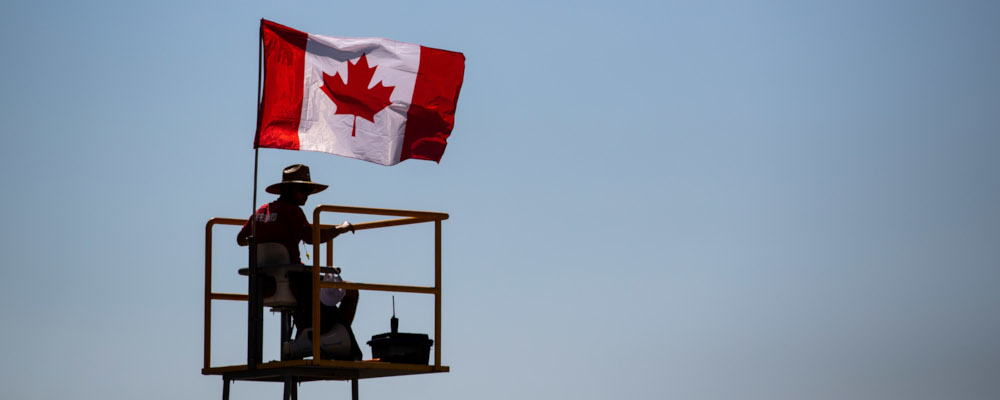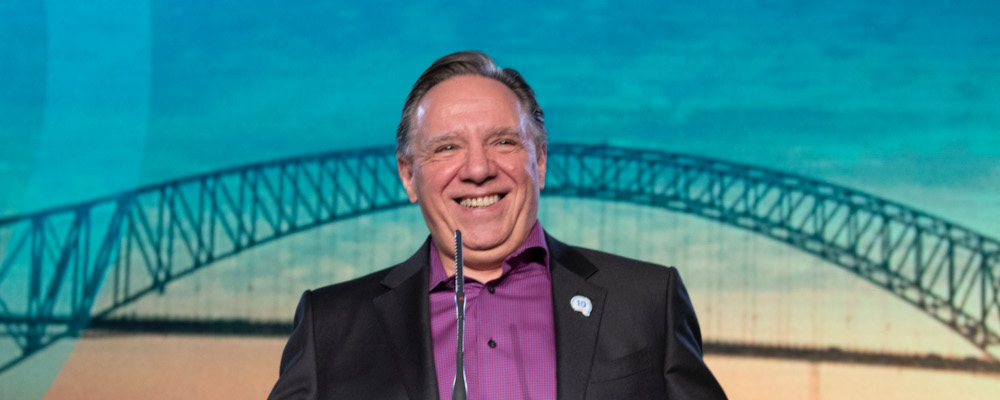To be a Canadian abroad is to chafe at being Canadian. Consciousness of home fades quickly overseas, a feeling encouraged by the general international indifference to our country. You scan the world’s papers in vain for mention of our politics. Soon you stop looking.
But there is a certain type of Canadian exile that can’t seem to let go. Norman Levine was one. Almost a decade after he had settled in England, he sailed back across the Atlantic years and travelled across Canada from Halifax to Ucluelet. His observations, published in England in 1958, were so bitter, so scabrous, that Canada Made Me didn’t find a Canadian publisher until 1979.
Levine’s fellow Canadian exile in England, Mordecai Richler, also made an early name for himself by lobbing poison darts back across the Atlantic at his old home. When he returned to Canada briefly in 1961, he was interviewed by Elaine Grand for the CBC about his scathing critique of his homeland.
You can almost imagine him as a young man in London, scanning the Times for something, anything, about Canada so that he could point to it and announce loudly to anyone who happened to be within earshot that he “can’t believe Canadians still care” about whatever story he finally found reported, before filing it away for his next obsessively dismissive piece about Canada for The Spectator or Commentary.
What is most surprising about the interview is how well it holds up. Much has changed in 60 years, but not the essentials. We are still a comfortable people, blessed by nature and history and physically and psychologically removed from the troubles of the world: a gated community at the edge of the global city.
Richler to Grand: “Living in Canada again, I am immediately struck that there is no indignation here. Our Canadian society lacks excitement or direction” and “in Canada, nobody is ever overthrown because nobody gives a damn.” The obvious and correct retort is that excitements of the kind that leads to coups are products of despair and harbingers of violence. If we hadn’t experienced a serious rebellion in more than a century, perhaps that wasn’t entirely a bad thing.
Richler is churlish to complain about comfort. Only a fool would wish that his life or the life of his country had been harder. In 1961, nothing of world-historical note had happened in Canada in more than two hundred years—nothing at least since the Battle of Quebec—and nothing of note has happened since.
And that is fine. Real history of the kind that inspires national epics and stirring anthems is nasty and difficult; a country that has mostly avoided history may lack memorable poetry, but it is probably a mostly blessed and peaceable country. Better the quiet paralysis of national ambivalence than the violent risk of national ambition.
For generations, people, including Levine’s father and Richler’s grandfather, left behind famine, invasion, and persecution to find peace in Canada. If they were grateful to be here, their spoiled heirs should not in good conscience have been dissatisfied. At least they could have spared us their ungrateful bile. When Richler wrote in Solomon Gursky Was Here that we are “not so much a country as a holding tank filled with the disgruntled progeny of defeated peoples” he was consciously echoing Levine, who three decades earlier asked himself:
“I wondered why I felt so bitter about Canada. After all, it was all part of a dream, an experiment that could not come off. It was foolish to believe that you can take the throwouts, the rejects, the human kickabouts from Europe and tell them: Here you have a second chance. Here you can start a new life.”
Richler had a mixed reaction to Levine’s book. He did not wholly endorse it, but nor could he wholly disagree with it. Reviewing Canada Made Me in the London Sunday Times, Richler wrote “It’s a sour, wilfully sordid book, evoking many scenes brilliantly, and far better than any other book I’ve ever read about Canada.” It still is, though it’s not an honest book. It dwells too much on the world of the lonely, the poor, and the downtrodden, but in its defence, it is no less dishonest than the Can Lit staples of its day that saw only the country’s upside. It was, if nothing else, a bracing corrective.
But even Richler, beneath his worldly pose, knew why the “throwouts, the rejects, the human kickabouts” came. “The best that can be said for Canada,” he wrote from an England recovering from post-war austerity, “(and I’m not underestimating this for a minute) is that a man is better paid for his work, and can live on a higher standard here, than he can almost anywhere else in the world.” They still come. And no longer just from Europe, but most for that same reason. It’s a good reason too. It deserves better than grudging parenthetical acknowledgment.
Most of them still succeed as the Levines and Richlers did before them. They keep coming, but we—their children and grandchildren and great-grandchildren—also keep leaving. Why is there this revolving door of aspirant would-be Canadians coming and aspirant worldly Canadians leaving? That is the more interesting question, and Richler had an answer for it too. “Young people are leaving Canada because they feel there is no opportunity for them at home and because they are bored,” Richler wrote, because “Canada is too bland for their tastes.”
It takes leaving Canada for a few years to fully appreciate the extent of our global irrelevance.
There is more opportunity at home now, but the blandness remains, even it is nothing like the impenetrable grey of Toronto the Good as Levine described it, with its boarding houses filled with bachelor emigres from Central Europe (the one Levine described was, by serendipitous stroke of fate, run by Mrs Richler, Sr.) and the subterranean bars where you had to buy a membership and sit at a table to drink.
Comparatively, though, Toronto remains uninspiring as a second-tier world city. It is still what people from small town Canada, and no one else, think of as a city. (There is a droll plaque in the crypt of St Paul’s Cathedral in London memorializing “Lord Thomson of Fleet,” which records that he was “A strange and adventurous man from nowhere.” The ennobled Roy Thomson was born in Toronto. The plaque is accurate.) But it is not fair to single out Toronto: almost no Canadian city makes an effort to be beautiful or liveable. They mostly rely on an unearned natural beauty, despite the best municipal efforts to obscure it.
Back to Richler: “There is so much assurance there. … Everyone I spoke to was so sure this was the right way to live and this is the way things should be done. … There seemed to be this parochial self-satisfaction.” One can hear in this mordant verdict an echo of William Weintraub writing to Richler about Canada Made Me that it “will certainly cause some panics around this smiling, beautiful country.”
A lot has changed, at least superficially, since then. We have a new flag, a new(ish) anthem, a new population, and a new multicultural identity. But the essential national character Richler fingered remains. Our national media’s house style is still priggish earnestness leavened with whiggish meliorism, and a reflexive suspicion of originality still stifles anything that smacks of élan or éclat.
As for politics, I suppose it’s impressive that we can still manage to be simultaneously so smug and so dyspeptic. Given the relentless triviality of our national squabbles, it is not surprising that the most popular choice in the last federal election was “did not vote.” Fortunately, our solipsism doesn’t affect our reputation, as the world quite understandably takes no notice of our domestic affairs and our foreign policy is conducted mostly by unread press releases.
It takes leaving Canada for a few years to fully appreciate the extent of our global irrelevance. That uncomfortable realisation may explain why a precocious young Richler couldn’t resist pricking our Canadian complacency: it was a writer’s desire to share his newfound sense of insecurity with those who stayed securely at home. Satire always thinks of itself as a public service, but it is mostly the ventilation of personal frustration.
As a people, we may not be a lot of things: sophisticated, profound, interesting. It is, however, ungracious for exiles to keep pointing this out. If you want to stay away, then stay away in mind as well as body. But eventually most of them return to Canada—some briefly like Levine, some permanently like Richler—a self-refuting act that puts the lie to their erstwhile criticisms. It shows that eventually an adolescent can grow out of his ingratitude, even a writer.
Or perhaps it just shows that, as one ages, bland comfort doesn’t look so bad. What Marcel’s Aunt Léonie called “mon petit traintrain,” the predictable routine of domestic chores that most of us eventually settle into, isn’t more satisfying in Paris or London than in Combray or Calgary. The youthful ambition that drives away a young writer like Richler with dreams of being Hemingway, or at least Morley Callaghan, is quietly overtaken by the domestic appeal of “le petit traintrain” Montreal style: a vodka grapefruit at Winnie’s followed by lunch at Le Mas des Oliviers.
Ambivalence, unlike ambition, can happen anywhere. Especially, perhaps, in Canada.
Recommended for You

RCMP spending to protect MPs may have risen 112% since 2018, as Canadian politicians face greater rise in threats

Geoff Russ: A future Conservative government must fight the culture war, not stand idly by

Antony Anderson: Lucy Maud Montgomery, the ‘magazine hack’ who gave us a Canadian cultural icon

Ginny Roth: Poilievre’s picture of Canada’s future looks a lot like the Calgary Stampede










